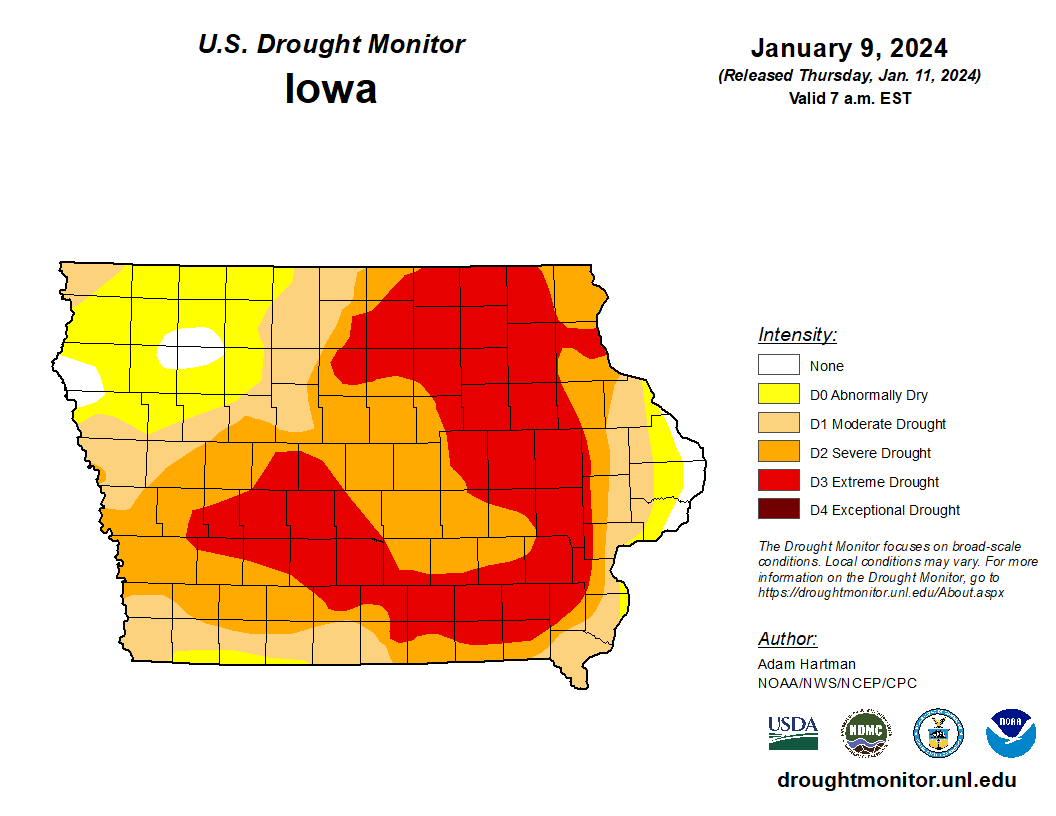Des Moines Water Works sees record demand, warns of possible water shortage this year
Des Moines Water Works says it produced and distributed a record-breaking 20 billion gallons of water in 2023 — but CEO Ted Corrigan warns that it may need to seek cutbacks if drought continues.
Iowa is entering its fourth year of drought, the longest stretch in two decades. Some other Iowa utilities, such as the Regional Water Rural Water Association in Avoca, were forced at points in 2023 to ask users to eliminate all nonessential water use and urge businesses and livestock producers to cut back as much as possible.
Des Moines Water Works was able to avoid such measures, but "we still need customers to use water wisely,” Corrigan said in a news release. “If drought conditions continue in 2024, we are prepared to implement our water shortage plan in order to ensure there is ample supply for public health over discretionary water use.”

The utility's average daily customer demand has grown in the past 20 years from 45 million gallons a day to just under 55 million gallons.
More: Who will make decisions about central Iowa's future water supply? Here's what to know.
The news release cites an increase central Iowa's population but also the drought, which led customers to water their lawns for longer stretches, as the likely causes of the increase in water demand. The latest edition of the U.S. Drought Monitor shows most of the Des Moines metro is in extreme drought, including the western and southern portions of Polk County and all of Dallas and Warren counties.
Des Moines Water Works pumped just under 19.6 billion gallons of water in 2022.
“Even with significant drought and ongoing source water quality challenges, the investments central Iowans have made in the water production system, as well as the expertise of our skilled employees, allowed us to treat and distribute the water the Des Moines metro needed,” Corrigan said in the news release.
What is Des Moines Water Works' plan for a water shortage?
The Des Moines Water Works water shortage plan prioritizes public health, including providing clean water for drinking, bathing and cooking, over other uses. It can be implemented in four stages, ranging from asking customers to voluntarily reduce lawn watering to prohibiting lawn watering and implementing water rationing.
More: As drought deepens, here's what you need to know about Des Moines Water Works' water shortage plan
The utility last implemented the plan in June 2021 when the drought greatly reduced river flows and customer demand reached 90% of water production capacity. It only enacted Stage 1, which calls for a voluntary 25% reduction in lawn watering, suspension of fire hydrant flushing and limits on other water-intensive activities, such as street sweeping and watering golf course fairways.
A ban on lawn watering ― Stage 3 ― would only take effect if customers fail to achieve water use reduction goals in the first two stages or a water shortage is possible without a further decline in usage.
"The intent of Des Moines Water Works’ Water Shortage Plan is to manage system demand so customers do not experience pressure, quality or availability issues during periods of extreme water demand or during other times when water availability may be limited," spokesperson Melissa Walker said via email. "It emphasizes restrictions on less-essential uses and avoids — when possible – restrictions on more essential uses such as indoor water use."
Des Moines Water Works has guidelines for water use that includes following a recommended program for lawn watering. The schedule and other tips for preserving water can be found online at dmww.com
Addison Lathers covers growth and development for the Des Moines metro. Reach her at ALathers@registermedia.com and follow her on Twitter at @addisonlathers.
This article originally appeared on Des Moines Register: Des Moines Water Works warns of possible shortage after record year
